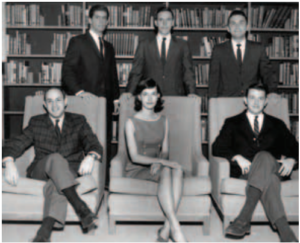Brooksley Born to Recieve John F. Kennedy Profile in Courage Award
I felt it was my public duty to let congress, the administration, and the public know about the potential dangers in the market. On the other hand, I am very sorry that it turned out I was right, because it has been a disaster for a lot of people who have lost a lot of money. I think there are still other disasters like that waiting to happen until Congress reforms the law and allows some federal oversight of this market.” From “Legends in the Law: A Conversation With Brooksley Born,” Washington Lawyer, October 2003, in which she discussed Enron’s reliance on derivatives as a factor in the company’s collapse.

Brooksley E. Born ’64 (BA ’61) was the right woman, in the right place, at the right time when she was head of the Commodity Futures Trading Commission (CFTC) from 1996 to 1999. It was still early days for recently legalized over-the-counter (OTC) derivatives when she proposed more oversight of the highly leveraged market. She pressed her case to some of the most powerful people in Washington, going toe-to-toe with Alan Greenspan, Robert Rubin, and Congress. But her recommendations were rebuked and a bill was passed that further restricted her office from taking any regulatory steps on OTC derivatives. Even the fall of Enron just after she left the CFTC wasn’t enough to make the powers that be listen. Today, the wisdom of her recommendations is clear.
“I certainly am not pleased with the results,” Born said in a recent Stanford magazine article of her efforts to regulate OTC derivatives, the failure of which has been blamed for much of the current economic crisis. “I think the markets grew so enormously, with so little oversight and regulation, that it made the financial crisis much deeper and more pervasive than it otherwise would have been.”
In recognition of her foresight and resolve while heading the CFTC, the John F. Kennedy Library Foundation has named Born a recipient of a 2009 Profile in Courage Award; she will be honored at a May ceremony at the John F. Kennedy Presidential Library and Museum in Boston. Considered a trailblazer for women, Born entered law school when there were still quotas limiting the number of women allowed in each class and very few of them made it to graduation. Despite the odds, she was elected the first woman president of the Stanford Law Review and received the Outstanding Senior Award. She graduated at a time when women comprised approximately 3 percent of the legal profession. Again she excelled, landing a coveted clerkship on the United States Court of Appeals for the District of Columbia Circuit with Judge Henry W. Edgerton. She then joined Arnold & Porter LLP as an associate in 1965 and went on to head its derivates practice. She retired in 2003.
